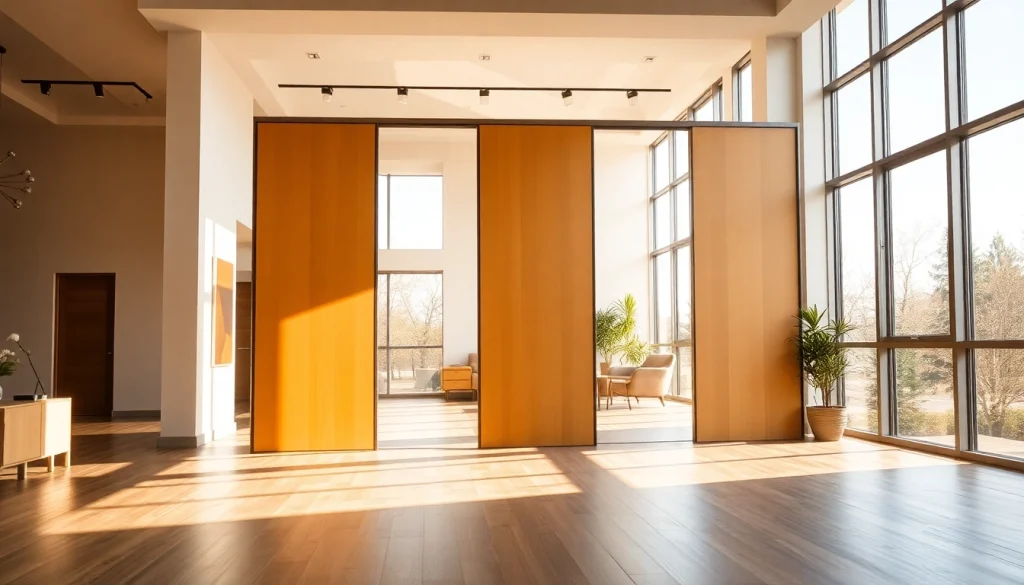Introduction to Folding Partition Walls
In today’s dynamic architectural landscape, optimizing space utilization is paramount for both commercial and residential environments. One of the most effective solutions for enhancing space versatility is the Folding Partition Wall. This innovative design provides flexibility in creating separate spaces that can be adapted to different needs over time. In this comprehensive guide, we will explore what folding partition walls are, their benefits, applications, and types, along with installation and maintenance guidelines.
What is a Folding Partition Wall?
A folding partition wall is a movable wall system that allows for the division of spaces quickly and efficiently. Constructed from various materials, these walls can be folded away or expanded to accommodate changing room layouts. They can range from simple screens to complex, acoustically treated panels, aimed at providing flexibility without compromising aesthetics or functionality. The mechanism can include tracks along which the panels slide, ensuring they can be effortlessly opened or closed as required.
Benefits of Using Folding Partition Walls
- Space Optimization: Folding partition walls are ideal for businesses and homes requiring adaptability. They allow for a large area to be transformed into smaller, more functional spaces.
- Cost-Effective: Investing in folding partitions can reduce the need for costly renovations or relocations by maximizing existing space.
- Quick and Easy Setup: Most partition systems can be installed quickly with minimal disruption, making them suitable for temporary or permanent applications.
- Improved Acoustic Control: Many folding partitions offer excellent soundproofing, making them perfect for offices, conference rooms, or any setting requiring privacy.
- Aesthetic Appeal: Available in a variety of designs and finishes, folding partition walls can enhance the interior decor, aligning with modern design trends.
Common Applications in Various Environments
Folding partition walls can be seen across a range of environments, including:
- Offices: Many companies use folding partitions to create temporary meeting spaces or collaborative areas that can be adjusted according to project needs.
- Schools: Educational institutions often divide larger classrooms or auditoriums into smaller, acoustically insulated spaces for lectures and activities.
- Hotels and Restaurants: These establishments utilize folding walls to enhance privacy and create adaptable seating arrangements for different occasions or events.
- Exhibition Centers: Folding partitions help in managing space during trade shows, making it easier to convert large open areas into multiple exhibits.
Types of Folding Partition Walls
Acoustic versus Non-Acoustic Folding Partition Walls
Choosing between acoustic and non-acoustic folding partition walls largely depends on the intended use of the space. Acoustic partitions are designed to minimize sound transmission between rooms, making them suitable for environments where privacy is crucial, such as offices, conference rooms, and recording studios. Non-acoustic partitions, while still providing some sound barrier, are more suited for environments where sound control is less of a concern, such as casual meeting areas or flexible workspaces.
Materials and Design Options
Folding partition walls can be constructed from a variety of materials, including:
- Wood: Offers warmth and aesthetic appeal; great for residential and high-end commercial applications.
- Glass: Enhances natural light and maintains an open feel while providing a modern touch.
- Fabric and Vinyl: Available in numerous colors and textures, these materials provide flexibility and can also have sound-absorbing properties.
- Metal: Often used for durable and secure environments, metal partitions can be painted or finished to match other interior elements.
Custom vs. Standard Sizes
Folding partition walls come in both standard and custom sizes. Standard sizes are readily available and can be more cost-effective; however, custom sizes are often necessary for unique spaces with specific layout needs. Custom partitions can be tailored in terms of height, width, and design, ensuring a perfect fit for any environment.
Installation Process for Folding Partition Walls
Preparation and Planning Steps
Before installation, careful planning is essential. First, measure the area to determine the appropriate size and type of partition wall. Understanding the purpose of the partition will help choose the right materials and design features. Additionally, considering factors such as accessibility and traffic flow will optimize the functionality of the space once the partitions are installed.
Tools Required for Installation
The installation of folding partition walls requires various tools, including:
- Drills and drill bits
- Level
- Measuring tape
- Screwdrivers
- Hammers
- Safety goggles
Professional vs. DIY Installation
While installing folding partition walls can be a DIY project for those with basic carpentry skills, hiring professionals can ensure proper installation and functionality. Professionals offer expertise, minimizing the risk of errors that could compromise the partition’s performance. Moreover, proper installation can enhance the longevity of the partitions, making it a worthwhile investment for many.
Maintenance and Care for Folding Partition Walls
Regular Maintenance Tips
To maximize the lifespan and performance of folding partition walls, regular maintenance checks should be conducted. This includes dusting the surfaces to prevent dirt and grime buildup, inspecting for any mechanical issues with the folding mechanisms, and checking the seals if there are acoustic features. Cleaning solutions appropriate for the partition material should be used to maintain visibility and aesthetics.
Identifying and Addressing Common Issues
Common issues such as misalignment, difficulty in folding mechanism operation, or wear and tear should be addressed promptly. Identifying the problem early can often prevent more significant repairs. Regular inspection will help in maintaining optimal functionality, ensuring that any complications are dealt with efficiently.
Longevity and Warranty Considerations
Many reputable manufacturers offer warranties for their folding partition walls, covering potential defects in materials or workmanship. Understanding the terms of the warranty can provide peace of mind. Moreover, proper maintenance practices can extend the life of the partitions. It’s advisable to document maintenance and repair history to assist with warranty claims if any issues arise.
Choosing the Right Folding Partition Wall for Your Needs
Factors to Consider When Selecting
When selecting the right folding partition wall, consider the following factors:
- Functionality: Determine how frequently the partitions will be moved and adjust for ease of use accordingly.
- Acoustic Properties: If sound control is essential in your space, prioritize acoustic folding walls.
- Design Aesthetics: Choose materials and colors that align with your overall interior design theme.
- Budget: Analyze your budget and decide on the best options to maximize value while meeting functional requirements.
Budgeting for Your Project
When budgeting for your folding partition project, consider both initial costs and long-term expenses. Initial costs include purchase, installation fees, and necessary tools, while long-term budgeting should include maintenance and any potential repairs. Creating a comprehensive budget plan will help in effectively managing finances and ensuring no unexpected expenses arise during implementation.
Consulting with Experts for Best Solutions
Consulting with industry experts can lead to better-informed decisions. These professionals can offer insights into the latest market trends, recommend specific products, and guide in customizing solutions that fit unique needs. Whether discussing design, installation, or maintenance, expert advice can be invaluable in achieving satisfaction and functionality.





